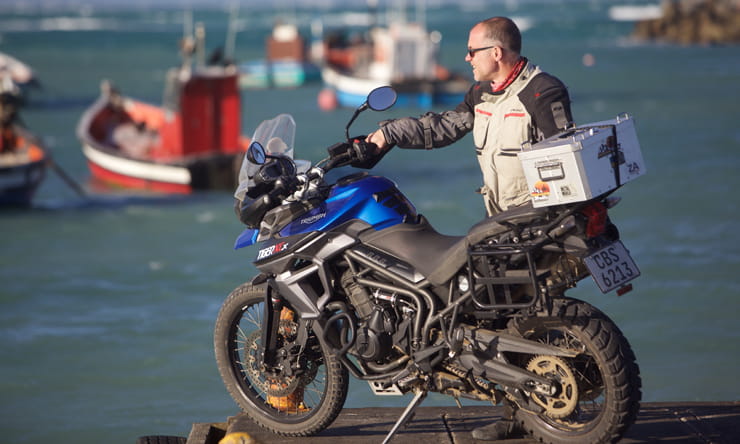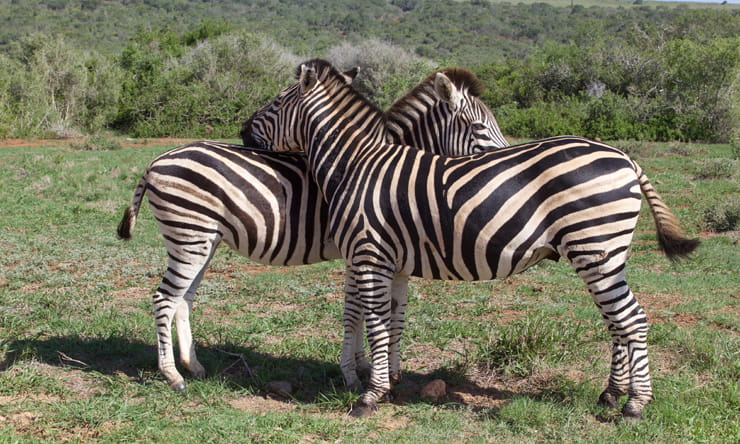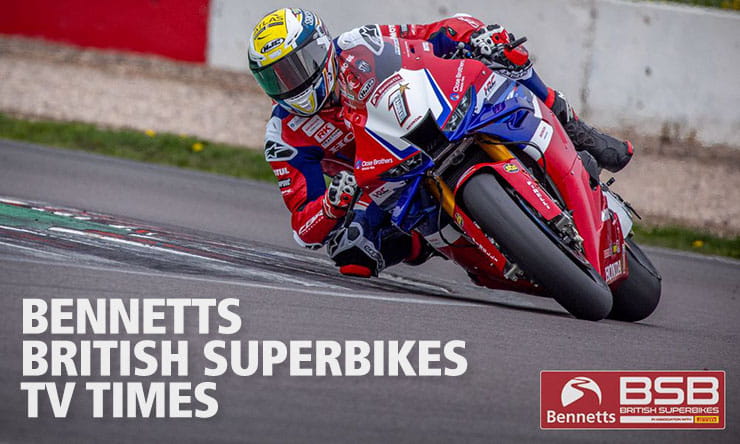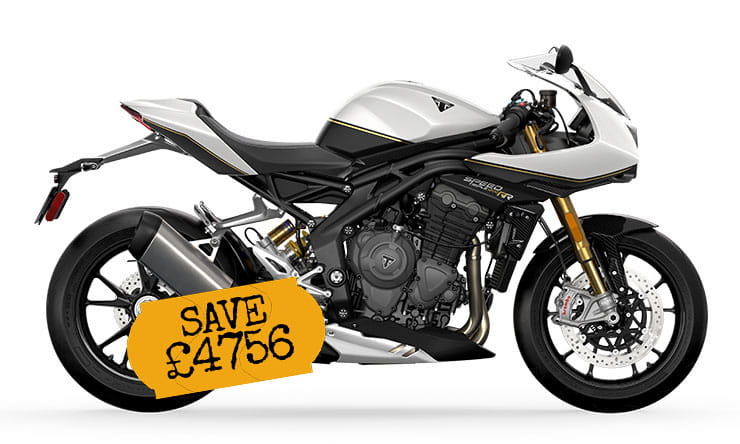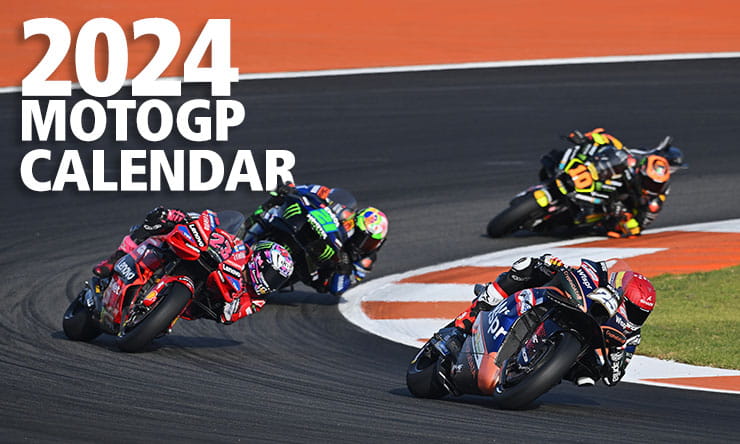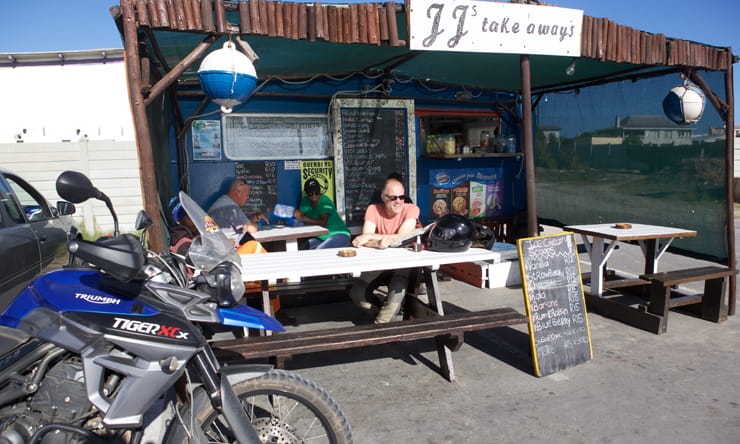
Will I get mugged?
Well I didn’t. Nor did my four fellow travellers, or Blazing Trail boss Damon I’Anson, or Dougie the support truck driver. Clearly, South Africa has nightmarish social and environmental problems. The scale of the poverty is shocking, there’s lots of crime and the education system – the ticket out of that situation – is in a mess. “It’s also a beautiful country free of malaria and dengue,” counters Damon, who in a previous life was a UK motorcycle journalist. “It’s got the most liberal and far-reaching constitution of any country in the world. There are empty mountain roads and balmy weather. They drive on the right and speak English. The loos are good. The food is amazing, The landscape is so diverse.” Damon lives in Mossel Bay, about four hours from Cape Town. He employs local people, pays them fairly, helps their kids’ education and is in love with the whole social experiment. “Just look at the resilience and optimism of people,” he said to me after I’d spent three weeks in the country. “Who have you met who wasn’t nice?” I had to admit: no one. And with a few basic precautions I never felt even slightly in danger.
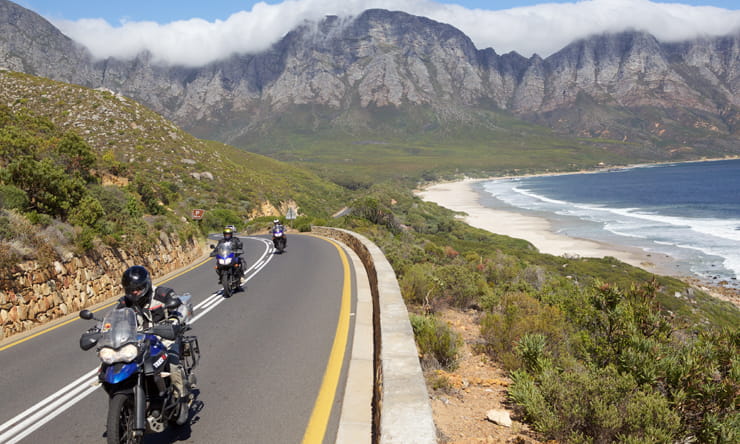
How good are the roads?
Once you get into the countryside, they’re empty. In 50-miles you might come up behind ten vehicles, all of which pull across to let you pass. But the best bits are the mountains, forests, dirt, and coast roads. Basically, you can pig out on smooth corners, dramatic climbs, desert remoteness and oceanic splendor. The R44 coast road from Cape Town to the penguins in Betty’s Bay is as dramatic as anything I’ve seen in Europe or the Himalayas: smooth, snaking tarmac with pounding turquoise ocean on one side, craggy mountains on the other and white clouds tumbling over the top. But my favourite route (I rode it six times) was the Franschoek Pass. It’s 20 minutes of motorcycling perfection.
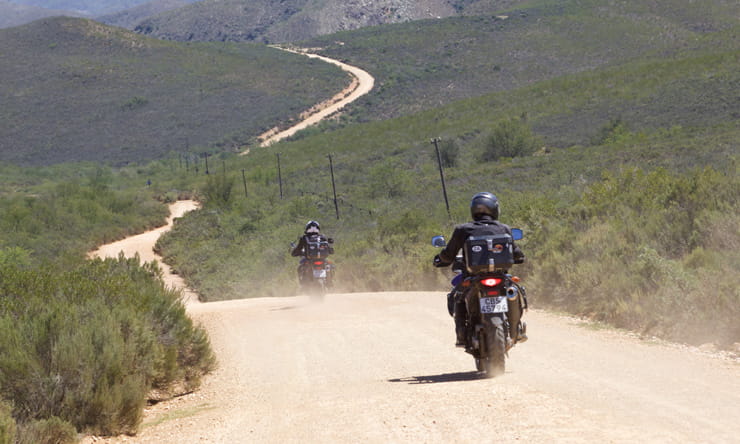
After a couple of days Damon reckoned we were all ready for a dirt road. It turned out to be 15-miles of dirt road. Starting alongside a giraffe reserve, then into open country where we saw kudu and smaller antelope, then dense scrub, then farmland, then suddenly school kids waving and shouting their appreciation of our two-wheeled space ships, despite the billowing dust we threw up. Everyone managed it, and liked it too.
What bikes can you ride?
Blazing Trails (BT) generally hire you a 650 V-Strom as part of the package. The manageable, reliable Suzuki is ideal for the tour’s pace and 1500-mile distance. But I chose BT’s new Triumph Tiger 800 XC, which with its WP suspension and torquey engine was pure luxury. Other upgrades are F700 (probably the best off road), or even an R1200GS.
All the bikes come with a top box for daily stuff with your main bag following in a support truck.
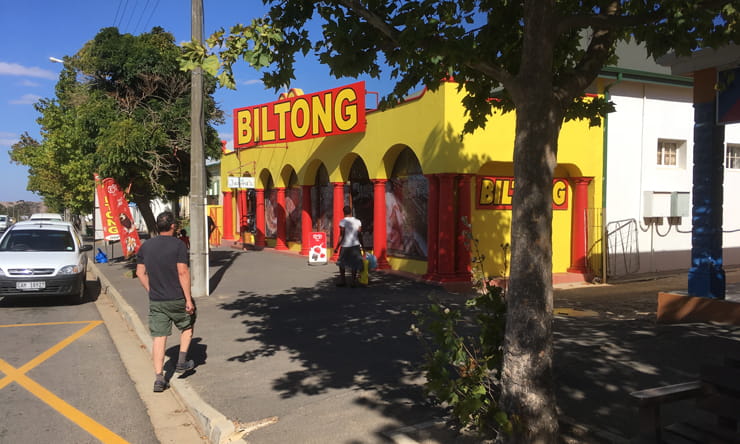
What’s the vibe like?
“Good afternoon, sir.” I’d been walking the hilly coast path for an hour without seeing anyone but a couple of fishermen down on the beach. Sitting on a rock to tip the sand out of my trainers I suddenly realised one of them had caught me up, and offered a ridiculously polite greeting to my back as he passed. “There’s a lot of respect here for older guys,” Damon explained later. Even if you’re the colour of the former oppressor.
But there is still a gulf in South Africa between poor black people and well-off white people – a legacy of apartheid and two, still very different, life experiences. A common pattern is wealthy people living in the best houses, often protected by walls and scary dogs, while poor people walk from townships each morning to cook, clean, garden and labour. And they’re the lucky ones.
The Rainbow Nation idea has made the most progress in Cape Town, where mixed race couples are completely normal. A quarter of a century ago they would have been regarded by the government as criminals. Trevor Noah’s outstanding autobiography Born a Crime explains how grim this was.
It wasn’t just European settlers who did the dividing and exploiting. Before them, black colonists from the north brought havoc too. The indigenous people are the Khoi San, who were genetically distinct from the rest of humankind for tens of thousands of years. Nelson Mandela was a member of the Xhosa nation, but had San ancestry.
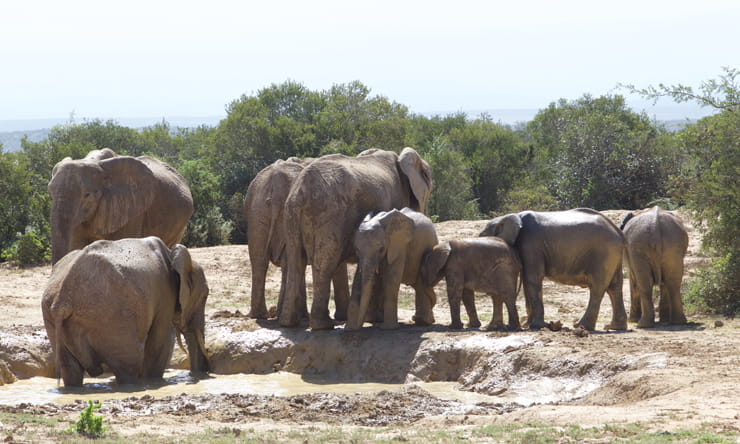
Will I see wildlife?
Oh yes. We had enough time to visit a big cat sanctuary, see penguins, wander a coastal forest and spend an unforgettable day in Addo National Elephant Park.
No amount of trips to Whipsnade as a kid will prepare you for your first glimpse of a wild elephant. In a zoo they are obvious. In their semi-natural ‘spekboom’ habitat they can vanish in three seconds. The first thing you notice is the way they move with this rolling, weary gait on baggy long legs. Then you notice that their skin is mostly covered in dry mud and earth. Then you make a mental note not to get in their way.
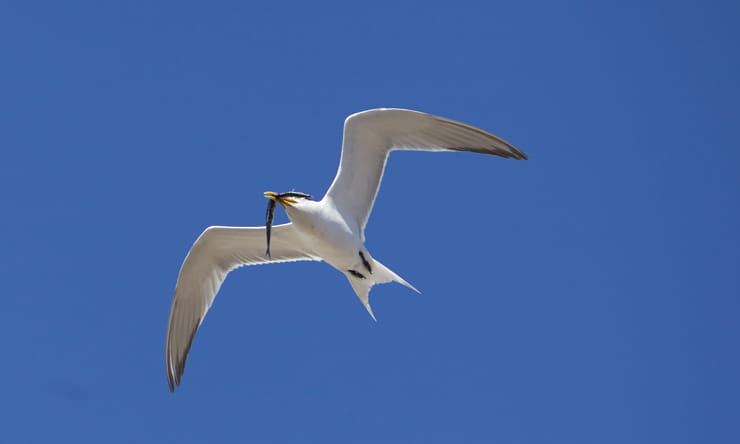
Besides elephants the park has plenty of other big mammals: buffalo, lion, leopard, kudu, warthog, hartebeest. Huge leopard tortoises too. There’s even a bit of wildlife left in the open countryside. Damon stopped to show us a southern pale chanting goshawk in the Great Karoo desert. And sailing to Robben Island we saw a huge sunfish in Cape Town harbour, followed by dolphins, penguins and seals. Southern Right Whales arrive on the coast in May and leave in November.
Where there’s suitable roadside cover, baboons are never far off. If you stop three or four of them will scamper out, there they are, lurking in the underbrush, eyeballing you. Even in the open they move with a kind of surly insolence. They are like orcs in Lord of the Rings: you’re pretty sure you could beat one in hand-to-hand combat if you were fully armed and at the top of your game. But there’s always a doubt.
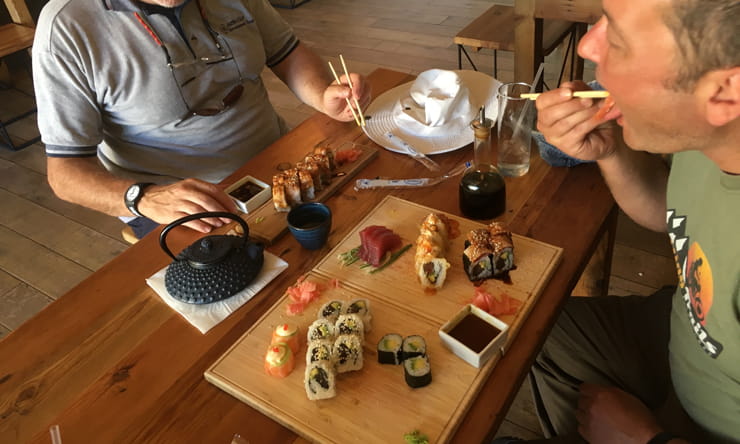
Will I put on two stone?
If hunger is a pea, then breakfast in a South African guest house smashes that pea with a mallet. If you’re in a South African hotel, the mallet is replaced with long range artillery. The variety and quality is simply fabulous. For lunch or supper you can have a decent feed with a beer for R150 [about £8], or pay double that for something really special like Karoo lamb (Mmm) or kudu steak (Yum). At times our tour resembled a motorised gastro experience, a feeling further enhanced by Damon’s ability to find classy roadside drink stops mid-morning and mid-afternoon. You will not go hungry.
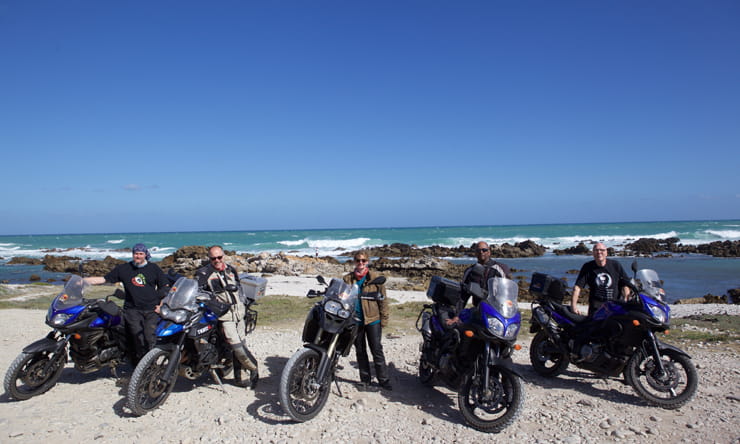
What does it cost?
I did Blazing Trails’ £2495 Taste of the Cape tour. The price gets you from Heathrow to Cape Town, then a second flight to George, and finally a pickup to the start in Mossel Bay (plus of course the journey back to the UK ten days later). It also covers nine nights of hotels and B&Bs, nine breakfasts, two dinners, a motorcycle, a support truck, and a fully accompanied itinerary you could not possibly discover by yourself. That left me to fork out about £400 for lunch, evening meals and petrol, plus another £200 for optional trips to see big cats, elephants and great white sharks.
If you like you can sort out your own air travel (I got to Cape Town via a work trip). A direct flight from Heathrow takes 12 hours, and costs around £650-£1000 return, depending on the operator, and how early you book. Other routes stop on the way, but 12 hours on a plane is plenty. The good news is there’s no jet lag: Cape Town’s time is pretty much identical to ours.
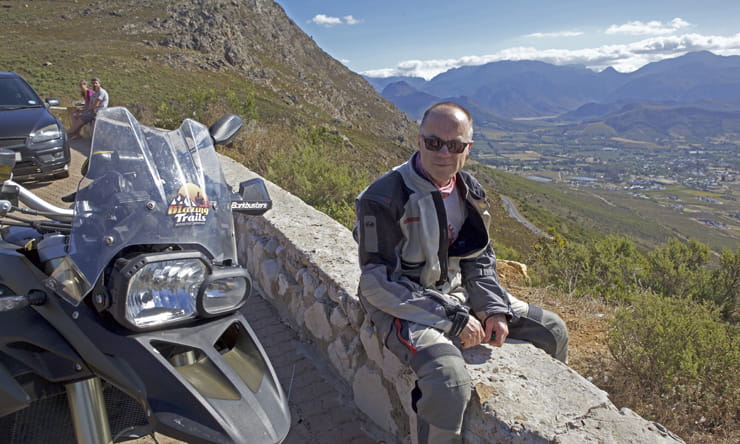
What do I wear?
The temperature in March ranges from 22 to 34 degrees so you’ll be hot in leathers, and that’s before you stop and walk about. So a good-fitting armored enduro suit is the most comfortable thing – the sort made by Held or Acerbis. Most of the time you’ll just have a technical T shirt on underneath. But bring a fleece too, which you can stow in your top box with water and waterproofs. Boots can be light off-roaders or normal bike boots, gloves can be shorties, and any helmet is fine. I used a Shark with a flip-down sun visor.
Do I need travel insurance?
Just like any holiday, a trip on a motorcycle – be it in the UK, Europe or beyond – can be ruined by delays, lost documents, illness and more. There are plenty of travel insurance options, but you need to make sure you get a policy that includes riding motorcycles, and if it does, that it's for bikes of the engine size you'll be riding (many only cover up to 250cc). At its most basic, you should look for insurance that provides cover for the following:
- Medical expenses
- Loss or theft of personal possessions
- Lost or delayed luggage
- Loss of your passport and other documents
- Travel delays and disruptions
- Having to cut your holiday short
In addition though, if you’re taking a motorcycle (or you're renting one while you’re away) be sure that your insurer will cover you for any medical expenses, should you have an accident. You must also think about where you’re riding – some policies won’t cover you if you’re trail or enduro riding, or if you’re on a race track. Remember – this isn’t about your bike being covered, it’s about your medical expenses, should the worst happen.
If you're only going away once, a single-trip policy will likely be all you need, but also consider an annual policy, which could extend to cover your family holidays too (a good insurer should also be able to offer cover for your whole family).
BikeSocial’s parent company, Bennetts, has a motorcycle-specific travel insurance policy – find out if it suits your needs by clicking here.
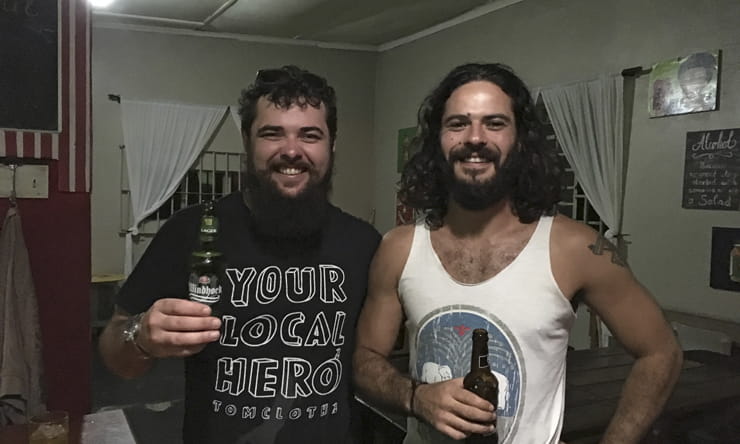
My favourite place
Was the Thirsty Herds Bar at Addo, 500-miles from Cape Town in the rural Eastern Cape. Damon and I left the paying guests at their impossibly posh country estate, and headed for his mate John Allderman’s guest house, which featured a bar and micro brewery in the garden. Run by two young guys named Josh and Zinon (pictured above left to right), the bar is a horizontally laid-back watering hole for locals. After a long day’s ride we took our cold beers and sat on comfy sofas under the trees with Doctor Feelgood on the speakers and cicadas around our ears, wondering how it could ever get cold enough to need the shoulder-high fire basket in the middle. Then Zinon, who looks like Jesus but with muscles, heaved two bags of wood in, and lit them up. “I usually fill it to the top but it’s been so hot today,” he explained. “This is just a little ambiance.” Moments like this are why you come on holiday to South Africa.






